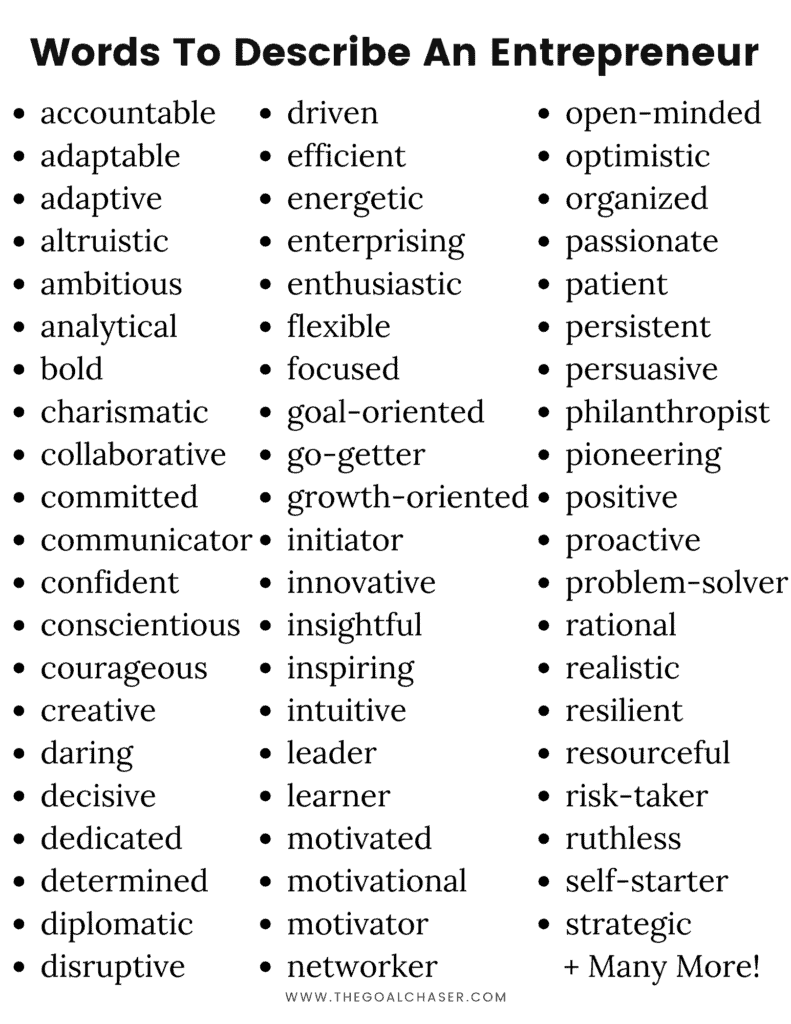80+ Words To Describe An Entrepreneur (With Definitions)
How Do You Describe an Entrepreneur?
An entrepreneur is a person who organizes and operates a business or businesses, often taking on greater than normal financial risks in order to do so.
They are often seen as go-getters and people who take initiative.
An entrepreneur is typically characterized by their ambition, creativity, determination and resourcefulness. They are passionate about what they do and have a strong vision for their business.
List Of Words to Describe An Entrepreneur:
Here is a list of adjectives that we could use to describe an entrepreneur.
Keep in mind that not all ‘entrepreneurs’ will encapsulate all of these adjectives. However, these are the characteristics that are most commonly seen in entrepreneurial personalities:
Accountable: holds themselves and their team accountable for results.
Adaptable: able to adjust quickly when something doesn’t work out as planned and/or to changing circumstances.
Adaptive: knows how to adjust their strategies in order to achieve the desired outcome.
Altruistic: Charitable and generous in spirit, behavior or attitude.
Ambitious: having or showing a strong desire and determination to succeed.
Analytical: able to break down complex problems and find solutions.
Bold: Outspoken, courageous and confident.
Challenge-seeker: someone who actively seeks out difficult tasks and complex problems.
Charismatic: ability to charm people and convince them of their vision.
Collaborative: can work well with others in order to achieve success.
Committed: devoted wholeheartedly and with enthusiasm.
Communicator: skilled at getting their point across in a clear and concise way.
Confident: believes in themselves, their team, and the success of their project.
Conscientious: pays attention to details and can recognize patterns in order to identify opportunities.
Courageous: isn’t afraid of failure and is willing to try new ideas.
Creative: able to produce original and unusual ideas.
Daring: Putting oneself in difficult or risky situations with courage and confidence.
Decisive: capable of making decisions quickly and confidently.
Dedicated: puts in the extra effort to ensure success.
Determined: having made a firm decision to do something.
Diplomatic: knows how to navigate difficult conversations and find a win-win solution.
Disruptive: open to trying new things and challenging the status quo.
Driven: motivated and determined to succeed.
Efficient: knows how to make the most of limited resources.
Energetic: full of energy and enthusiasm.
Enterprising: knows how to identify opportunities and take advantage of them.
Enthusiastic: passionate about their work and eager to take on new challenges.
Financially literate: understands financial concepts and can make sound decisions with regards to the finances of their business.
Flexible: able to change plans in response to changing circumstances or customer needs.
Focused: can stay laser-focused on their goals, even when there are distractions.
Goal-orientated: having a clear and focused objective in mind.
Go-getter: proactive and willing to take risks in order to make things happen.
Good listener: pays attention to what’s being said and provides meaningful feedback.
Growth-oriented: always looking for ways to improve and build upon existing success.
Gumptious: has the courage to tackle any challenge and make bold moves.
Initiator: takes action quickly, without waiting for someone else to take the lead.
Innovative: can think outside the box and come up with creative solutions.
Insightful: can look at a problem from multiple angles and come up with an innovative solution.
Inspiring: can bring out the best in people and make them feel empowered.
Intuitive: can sense what needs to be done with little or no information.
Leader: knows how to rally people around a cause or goal.
Learner: open to feedback and actively working towards self-improvement.
Motivated: able to push themselves to keep going and achieve their goals.
Motivational: able to inspire their team and keep morale high, even during difficult times.
Motivator: encourages others to be their best and reach their goals.
Networker: builds relationships and networks in order to further their business goals.
Nurturing: understands that employees need support and guidance to perform at their best.
Open-minded: willing to listen to different perspectives and consider new ideas.
Optimistic: always looking for the silver lining, even in difficult situations.
Organized: able to manage multiple tasks at once and prioritize important work.
Passionate: deeply invested in their work and driven by a desire for success.
Patient: understand that success takes time and can handle setbacks without giving up.
Persistent: continuing firmly or obstinately in a course of action despite difficulty or opposition.
Persuasive: knows how to convince others of their ideas and get them on board with their initiatives.
Philanthropist: driven by a desire to make a positive difference in the world and use their resources in order to do so.
Pioneering: not afraid to blaze their own path and go against the grain.
Positive: will always look for the good in any situation and remain hopeful for better outcomes.
Proactive: takes the initiative to get things done before being asked or instructed.
Problem-solver: can identify problems, evaluate potential solutions, and come up with the best possible answer.
Rational: able to make decisions based on facts rather than emotions.
Realistic: knows how to set achievable goals and manage expectations.
Resilient: able to bounce back from failure and keep going.
Resourceful: makes the most of available resources, even when operating with limited funds.
Responsible: knows how to take ownership of their mistakes and learn from them.
Results-oriented: focused on getting the job done in an efficient and effective way.
Risk-taker: not afraid to take risks in order to achieve their goals.
Robust: can handle stressful situations without crumbling under pressure.
Ruthless: not afraid to make tough decisions in order to achieve their goals.
Self-disciplined: knows how to prioritize work and stay on task without getting distracted.
Self-motivated: capable of motivating themselves without needing external encouragement.
Self-starter: can take initiative and get things done without needing someone to guide them.
Socially savvy: able to network and build relationships with potential partners and investors.
Solution-oriented: knows how to identify problems, brainstorm solutions, and make it happen.
Strategic thinker: can think ahead and plan for potential problems or opportunities.
Strategic: knows how to develop a plan of action and execute it successfully.
Strategist: capable of planning for both the short-term and long-term goals of their business.
Thoughtful: considers the long-term implications of their decisions before acting.
Trustworthy: people feel comfortable entrusting them with important tasks.
Visionary: has a clear vision for where they want to take their business and how to get there.
How Do You Describe Entrepreneurship?
Entrepreneurship is the act of creating and running a new business, often starting with an innovative idea.
Entrepreneurs will usually identify a need in the market, take risks to fill that gap, and aim to earn a profit or make a social impact.
It’s about spotting opportunities, being resourceful, and bringing new products or services to life. While it can be rewarding, it also comes with challenges like financial risks and competition.
You may also like:







